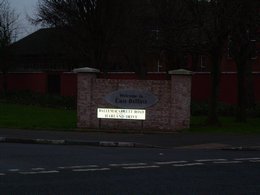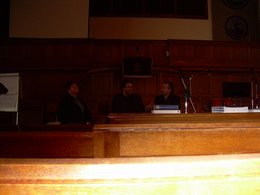
Gareth kicked the Soliton Sessions off for us in Belfast on Thursday.
Trevor facilitated a conversation on the impact of Martin Luther King’s writtings for today, and how we can gain hope from them. We talked briefly about the idea of heaven coming down to earth, figuring out what it looks like to build Gods kingdom in our midst. Someone (maybe Trevor?) commented on how we can claim and use the title ‘New Belfast’ just like there is a ‘New Jerusalem’. We discussed how it can be so discouraging to look around at the world and feel like we have nothing to give – not enough money or whatever – but sometimes all we have to do is get on the same level as people (Big Issue sellers, homeless guys, etc) and simply acknowledge their humanity. The question was raised, has our culture taught us not to dream, but instead to stifle our creativity?
“Answers are never really answers – just hints of truth.”

After lunch Derek Poole and Linda Gould from CCCI spoke briefly on peace and reconciliation, in Northern Ireland particularly. When asked about one thing they’d like to see change in the church, Derek said something that’s stuck with me:
“We are social creatures that are shaped by the poetics of space. I’d like to see a change in emphasis from a strong emphasis on immanence (the God who is near) to a stronger emphasis on transcendence (the God who is other and mystery). For that change to affect our spaces and gatherings. We need a deep sense of the otherness and the mystery of God so that we may learn to see the holy in the ordinary. A space that is fundamentally about an alternative consciousness, and nudges us again towards the numinous. One expression of numinous today are the artists”

The afternoon conversation I took part in was facilitated by Rob and Angela Spain, and looked at the death and regeneration of churches, and decentralised methods of church. I loved this session I have to admit – helped me to understand it a bit more!
We talked about the passage from John 15, and how we look at it very introspectively – what if we look at it in a world-wide view? Vineyards are pruned, but the parts that are cut off aren’t burned, they could be used to compost, fertilise.
Rob talked about how the Internet is a model of this type of scale-free organisation – not random distribution, but connected around hubs that are seen as important, and the hubs are also all interconnected. The connections are fluid and liquid, as the nature of the system is that it is always changing.
Is the ‘dying’ of church then a form of redistribution? It’s not necessarily a bad thing then, if we learn to embrace it, and view the redistribution from a more kingdom mindset.
“Maybe the church appears where connectivity between each other appears.”

I’m glad you got something out of this,it all sounds interesting, but not something I could cope with.
I’d only end up saying things to people that would offend them.
I think that’s mostly the point of it Jimmy… creating a safe space so that everyone, regardless of background/viewpoint, can ask their questions without fear of being ridiculed. There were some questions raised I’m happy I know the answer to, while for others they are vitally important questions for now. I’m equally certain that others felt the same about some of my questions, but that doesn’t make them any less valid for me! I liked that we could share our questions openly like that.
I would have loved to be there and to take part in those conversations. It looks as though they covered some amazing stuff by what you have wrote and these are hot topic issues in todays “church movement”. I answered your question on my blog by the way.
Peace, Shawn
Emma – was good to meet you overthe weekend and I’m glad that you got a lot out of it – hey you even get a mention on tallskinny’s blog!
Hey there, Emma! Great thoughts for your time in Belfast. I appreciate your perspective on Soliton. The first quote (above the second picture) is brilliant. One theologian (Scott McKnight) calls this a “chastened epistemology,” which essentially says, “This is what I believe to be true about God, but I could be wrong. Let’s talk.” It’s pretty amazing how much Christian dogma is informed just as much by (sometimes more than) our cultural context as the Sacred Texts of scripture.
Was great to meet you guys (Brodie and Brandon!) at the weekend, hope you got as much from it as I did. Brandon – I haven’t read McKnights book as of yet, but I plan to at some point in the future (add it to my long and ever-growing book queue!).